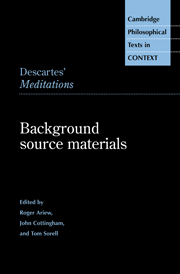Book contents
- Frontmatter
- Contents
- Preface
- Abbreviations
- General Introduction
- 1 Dialectic
- 2 That Nothing Is Known
- 3 The Promotion of Mathematics
- 4 Metaphysical Disputations
- 5 Wisdom
- 6 A Compendium of Philosophy in Four Parts
- 7 Corpus of Philosophy
- 8 The Use of Reason, The Impiety of the Deists, and The Truth of the Sciences
- 9 Unorthodox Essays against the Aristotelians
- 10 The Two Truths and The Immortality of the Soul
- 11 Dialogue on the Diversity of Religions and Little Skeptical Treatise
- 12 Universal Science
- 13 That God Exists
- Appendix: Condemnations of Cartesianism
- Bibliography
- Index
8 - The Use of Reason, The Impiety of the Deists, and The Truth of the Sciences
Published online by Cambridge University Press: 05 June 2012
- Frontmatter
- Contents
- Preface
- Abbreviations
- General Introduction
- 1 Dialectic
- 2 That Nothing Is Known
- 3 The Promotion of Mathematics
- 4 Metaphysical Disputations
- 5 Wisdom
- 6 A Compendium of Philosophy in Four Parts
- 7 Corpus of Philosophy
- 8 The Use of Reason, The Impiety of the Deists, and The Truth of the Sciences
- 9 Unorthodox Essays against the Aristotelians
- 10 The Two Truths and The Immortality of the Soul
- 11 Dialogue on the Diversity of Religions and Little Skeptical Treatise
- 12 Universal Science
- 13 That God Exists
- Appendix: Condemnations of Cartesianism
- Bibliography
- Index
Summary
Introduction
Marin Mersenne (1588–1648) was a mathematician, musician, and natural philosopher. However, his main contribution to the philosophy and science of his day was his indefatigable promotion of scientific activity. Educated at the Jesuit College of La Flèche (which Descartes also attended), he entered the order of the Minims, and from his cell at their convent near the Place Royale in Paris, he acted as the center of a vast correspondence network, bringing together notable philosophers, mathematicians, and scientists. He championed the new science, publishing translations (or paraphrases) of Galileo's early mechanics and his Two New Sciences. Moreover, he served as Descartes' link to the learned world while Descartes lived in the Netherlands, assisting in the publication of Descartes' works, soliciting the Objections to the Meditations (except for the First Set of Objections), and composing the Second and Sixth Set of Objections. Among his early works were two short religious tracts, L'usage de la raison and L'analyse de la vie sprituelle (both 1623), a massive commentary on Genesis, Quaestiones in Genesim (1623), and two hefty philosophical treatises, L'impieté des deistes (1624) and La vérité des sciences (1625). The first of the two religious tracts was rediscovered in 1978, but the second remains lost. Mersenne intended the two religious works as contributions to the extremely popular early modern literary genre of devotional exercises, to be placed alongside those of Saint Ignatius of Loyola, Eustachius a Sancto Paulo, and Saint François de Sale.
- Type
- Chapter
- Information
- Descartes' MeditationsBackground Source Materials, pp. 136 - 165Publisher: Cambridge University PressPrint publication year: 1998



